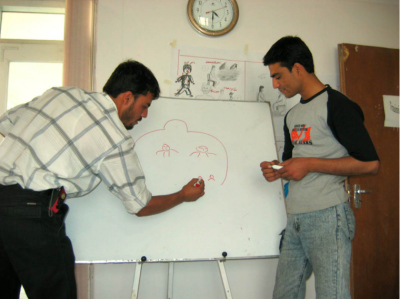Because Focusing comes from a new philosophy, it enables a fundamentally different way of doing almost any activity. Focusing provides access to the experiential intricacy of one's situation, which generates new possibilities for carrying life forward. It also makes for empathic attitudes towards oneself and others and all forms of life. So it makes the world a better place. But here I want to emphasize how Focusing leads to developing a precise way for achieving the purpose inherent in many fields. I can formulate this best with examples.
For example: Everyone who works with schools would like the children to discover the excitement of thinking, learning and curiosity, but it hasn’t been known “where” that discovery happens in a child, and how to enable a child to attend there. We have specific researched instructions for reaching that level in a child.
-- above is an excerpt from Vision Statement for Focusing Action Steps and Projects by Eugene T. Gendlin, Ph.D.
ARTICLES & RESOURCES
Urban Planning
This talk, "Using the Felt Sense to Create Considerate Environmental Designs," was given at the Felt Sense Conference in New York City in 2018 by urban planner Ram Eisenberg of Israel.
 Afghanistan
Afghanistan
Haqmal Daudzai in Trainer workshop, with Trainer-in-training drawing the guests he met in his Guest House inside himself.
From Focusing in Community Psychosocial Wellness: Afghanistan, El Salvador, Pakistan (Slide Show) by Nina Joy Lawrence, Dr. Patricia Omidian, Jerry Conway, and Beatrice Blake
< SEE DETAILS >
A Better World
< SEE DETAILS >
Expressive Arts Therapies -
Accessing the Body's Wisdom and Creative Intelligence by Laury Rappaport, Ph.D., ATR-BC. Focusing provides an effective way of listening to the innate wisdom of the body, while art therapy harnesses and activates creative intelligence
Addictions
- Experiential Focusing and Twelve Step Recovery by Steve Crawford, MA
- RECOVERY FOCUSING: Recovering our True Self, Accessing our Higher Self, and Connecting to our Higher Power by Suzanne Noël, Focusing Trainer, Costa Rica
- How Change Can Happen: Growth toward Wholeness or Addictive Response by Ann Marie Wyrsch
- Being-with the being-without : relational focusing with substance misusers by Alan Tidmarsh. Paper presented to the 22nd International Focusing Conference, 5-9 May 2010 Hohenwart Forum, Germany.
Trauma
An individual's sum total of life experiences, including traumatic events, saturates every part of his or her physical body. A person is much more than the thin, shifting attention or consciousness.
It is crucial for clinicians and therapists to realize these depths when helping patients to heal from and move past traumatic events. Methodologies that deal with traumatic experiences at the juncture of body-mind are highly effective. A somatic approach is needed since factors affecting the body keep the trauma in place. More...
Body Work
- Meeting at the Edge 2009.
- Report on "Focusing in the Body-Centered Professions:Meeting at the Edge" in Ischia, Italy, May 14-17 2007.
- The Bodywork and Focusing forum
- The Integration of Focusing with Other Body-Centered Interventions by Neil Friedman, Ph.D.
- Meet your body - Bringing Authentic Movement to Focusing by Barbara Chutroo
Research
- Research Review by Marion N. Hendricks, Ph.D.
- Experiencing Level as a Therapeutic Variable by Marion N. Hendricks, Ph.D.
- Experiencing Level in Dreams: An Individual Difference Variable by Marion N. Hendricks, Ph.D.
- Focusing: An Adjunct Treatment for Adaptive Recovery from Cancer by Doralee Grindler Katonah, Psy.D. Advocate Medical Group Center for Complementary Medicine Park Ridge, IL Judith Flaxman, Ph.D. Illinois School of Professional Psychology, Chicago Campus
- Effect of "Clearing a Space" on Quality of Life in Women with Breast Cancer by Joan Klagsbrun, Susan L. Lennox, and Lauren Summers
- Focusing with Adolescents: Discerning Self-Identity and Cultivating Self-Determination by L. Louanne Ellison-Cole.
- Concrete Interventions are Crucial: The Influence of the Therapist's Processing Proposals on the Client's Intrapersonal Exploration in Client-Centered Therapy by Rainer Sachse
Children
- Children Focusing Corner, History and Organisation
- International Children Focusing Conferences
- Children Focusing Coordinators and Contact Persons
- Children Focusing Discussion List
Spirituality
- Interview with Eugene T. Gendlin
- Focusing and Spirituality
- Judaism
- Biospirituality
- Focusing and Buddhism
Medicine
- Effect of "Clearing a Space" on Quality of Life in Women with Breast Cancer by Joan Klagsbrun, Susan L. Lennox, and Lauren Summers
- Leratong ~ "The Place of Love": Focusing in a South African Hospice by Catherine Johnson, Focusing Trainer, South Africa
- Listening from the Heart to People Living with Cancer by Mary Ellen Summerville, C.S.W., M.Div.
- Felt Sense and Cognitive Function by Doralee Grindler Katonah, Psy.D., M.Div.
- Focusing and Medical Decision-Making by Doralee Grindler Katonah, Psy.D.
- Listening and Focusing: Holistic Health Care Tools for Nurses by Joan Klagsbrun, Ph.D.
Creative Process
Composing Guidelines by Sondra Perl, professor of English at Herbert Lehmann College and founder of the New York City Writing Project.
Science
A Critique of Relativity and Localization by E. T. Gendlin and J. Lemke
Business
- Facilitative Focusing - How to use focusing with 'non-focusers' in work situations by Mary Jennings
- Focusing/Listening Training Program in Business Corporations: A Personal Account of its Development in Japan by Akira Ikemi, Ph.D.
- Managers can benefit from an overlooked resource: the gut by Catherine Johnson and Maryse Barak
